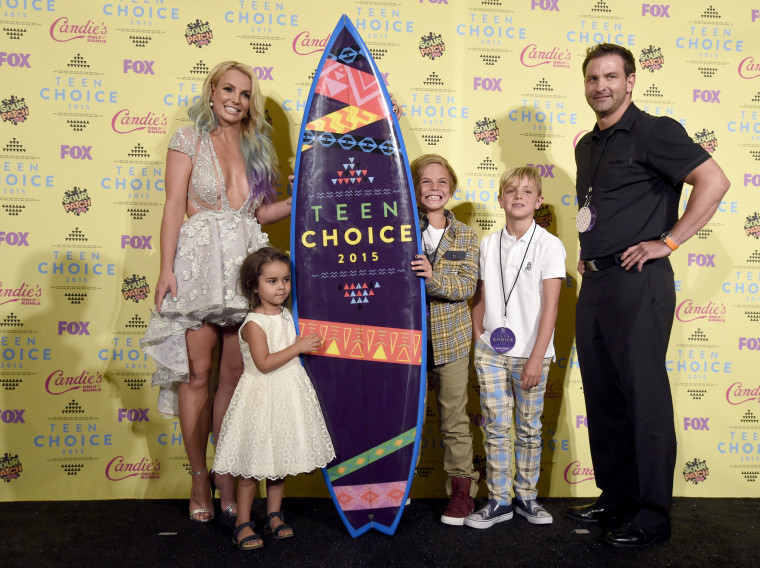What do Jesse Williams, Detroit Tigers player Miguel Cabrera, Drake, Nas, Britney Spears and former Illinois Congressman Joe Walsh have in common? Child support issues.
It’s fairly common: 13.6 million American adults, in 2015, were the custodial parents of 22.4 million children under the age of 21 while the other parent lived outside the house. (Statistically, 80.4 percent of custodial parents are mothers.) About half of those custodial parents have formal or informal arrangements for financial support from the non-custodial parent, and nearly 88 percent of those parents had a formal legal order entitling them to a specific amount of financial support.
Only 43.5 percent of the custodial parents due to receive a specific amount of child support, though, received all that they were legally owed. Celebrities, it seems, are just like us.

For instance, Flo Rida’s dispute with the mother of his disabled child — in which he’s tried to avoid paying $8,000 a month for the care of his child — is ugly, but in many ways is incredibly mundane because the arguments are the same as in so many other cases, like the idea that the mother of his child earns too much and he doesn’t personally care for his kid. Jesse Williams tried to argue (contrary to established law) that spousal support should cover his child support expenses and that he shouldn’t be on the hook for his children’s college savings since, once they turn 18, he’ll no longer be required to pay child support. (He was ordered to pay 10 percent of his monthly income in child support anyway.) As with the case of Kevin Federline vs Britney Spears, people often also argue that the requested amount is more than a child could possibly use directly.
When child support is discussed in popular culture, it is often presented as a windfall for the custodial parent — unearned money that can be squandered on nails, hair and other experiences allegedly unrelated to the child’s care. But the goal of child support has never been for the amount to be based on direct expenditures on the child: It is intended to give a child a similar lifestyle to the one that they would have if their parents were together.
That means support amounts that can cover the gap in housing, toys, vacations, private schools and lessons. It might be an amount that takes into account, a need for specialized therapy or, for a child with food allergies, the difference in food costs to meet their needs. Every child is different, but the fact that their parents both need to contribute doesn’t change.
The goal of child support has never been for the amount to be based on direct expenditures on the child: It is intended to give a child a similar lifestyle to the one that they would have if their parents were together
Although the way that child support is calculated varies from state to state, the cases that get the most attention are celebrity cases. The amounts sound high, but that's because the earnings are high, and the most common model is percentage-based. Thus, 20 percent of $175,000 is going to yield a higher number than 20 percent of $1,750 dollars a month. So, while a request like Kelis’ to raise child support from $8,000 a month to something higher based on Nas’ current earnings can sound excessive, the reality is that the requested is far less than 20 percent of his monthly income. It’s not even 10 percent.
Celebrity cases reflect the experiences of the wealthy, not necessarily the experience of the average person. And, though high dollar amounts get a lot of media coverage, they invariably draw the conversation away from the reality that the average support order is for $480 a month per child and the median is only $350.
Further missing from many child custody conversations is the fact that, on average, custodial parents contribute a higher percentage of their income towards a child than non-custodial parents. Kids cost money: Everything from clothes to food to health care will cost more as children age, and that doesn’t include increasingly fundamental expenses, like those for extracurricular activities in school, sports or arts fees, or simply the cost of carting them around. According to the 2013 US Census report child care costs have risen by almost 70 percent in the last 30 years while wages have remained largely stagnant.
Missing from many child custody conversations is the fact that, on average, custodial parents contribute a higher percentage of their income towards a child than non-custodial parents.
Take my situation: As of this month, my ex-husband has paid just under $79,000 in child support. That sounds like a lot, until you divide it by 16, which is the number of years since we separated and I took custody of our son; his contribution to the expenses incurred in raising our child averages out to not quite $100 a week, which is right around the national average of $480 a month. That money was not enough to come close to paying half of any child’s expenses.
My ex has had a host of excuses over the years for not paying more, and most have been about his lack of employment. He reasons that, when he’s struggling to pay his own bills, he can’t be expected to contribute to our child. As the custodial parent, even before I met my current husband, I never had the luxury of that choice. But my son never felt any lack of financial wherewithal, regardless of his other parent’s contribution: I made sure of that on my own, and then my husband made sure of that as a couple.
Financially supporting a child can feel like a never-ending drain on your resources when money is tight, but, as a parent, you have that responsibility. Child support isn’t about whether you like your ex or your child, and it isn’t a punishment or a scam: It’s the most basic responsibility.
Kids need to eat every day, they need clothes, shoes, a roof over their heads and so much more to be healthy well-rounded people who are prepared for life. Being a parent isn’t an easy job and it’s never just about the money. Parenting is about the time, energy and the love you feel for your child that should motivate you to make sure all their needs are met. But if you won’t give your child your time, your energy and your love, then the least anyone can do is make sure you give their custodial parent the money to make sure they can get fed and see a doctor.
Mikki Kendall is a writer from Chicago. She has written for The Washington Post, Boston Globe, Time, Ebony, Essence and other online and print markets.
